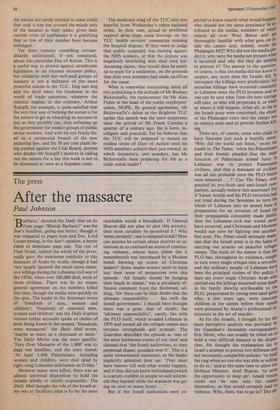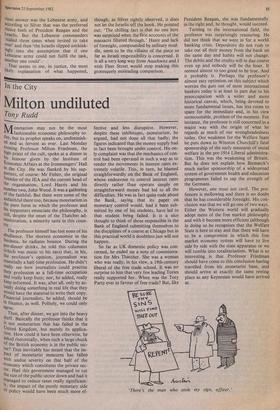The press
After the massacre
Paul Johnson
arbaric,' shouted the Daily Star on its front page. 'Bloody Barbaric!' was the Sun's headline, going one better; though it was relegated to pages four and five, Lord Lucan having, in the Sun's opinion, a better claim to dominate page one. The rest of Fleet Street, indeed the whole of the press, really gave the maximum publicity to this massacre of Arabs by Arabs, though it had very largely ignored the much more exten- sive killings during the Lebanese civil war of the 1970s, when over 100,000 died, most of them civilians. There was by no means general agreement on the numbers killed this time, though the media were quickly on the spot. The leader in the Scotsman wrote of 'hundreds of men, women and children'; 'hundreds of unarmed men, women and children' was the Daily Express version (other accounts spoke of caches of arms being found in the camps). 'Hundreds were massacred,' the Daily Mail wrote, `maybe as many as a thousand or more.' The Daily Mirror was the most specific: `Fury Over Massacre of the 1,800' was its page one headline, and the story stated: `At least 1,800 Palestinians, including women and children, were shot dead by right-wing Lebanese militiamen on Friday.'
However many were killed, there was an almost universal disposition to hold the Israelis wholly or chiefly responsible. The Daily Mail thought the role of the Israeli ar- my was to 'facilitate (that is by far the most charitable word) a bloodbath. If General Sharon did not plan or plot thi* atrocity, then most certainly he permitted it.' Why `most certainly', one is tempted to ask? How can anyone be certain about motives or in- tentions in so confused an arena of continu- ing violence, whose latest phase (be it remembered) was introduced by a Moslem bomb blowing up scores of Christian leaders? Some leader-writers seem to have lost their sense of proportion over this episode. 'All Israelis should be hanging their heads in shame,' was a peculiarly of- fensive comment from the Scotsman, ad- ding, 'for there can be little doubt that the ultimate responsibility ... lies with the Israeli government.' I should have thought there was a great deal of doubt; the `ultimate responsibility', surely, lies with the PLO itself, which invaded Lebanon in 1970 and turned all the refugee camps into terrorist strongholds and arsenals. The Guardian described the episode as 'one of the most barbarous events of our time' and claimed that 'the Israeli authorities, to their perpetual shame, presided over it'. This is a quite unwarranted statement, as the leader implicitly admitted later on: 'They must have known full well what would happen, and if they did not know beforehand (which is scarcely credible in people so well inform- ed) they learned while the massacre was go- ing on over so many hours . . .
But if the Israeli authorities were ex- pected to know exactly what would happen, why should not the same prescience be at- tributed to the media, members of which swarm all over West Beirut and are thoroughly familiar with what goes on in' side the camps and, indeed, inside the Phalangist HQ? Why did not the media pre- dict it, why were the media not present when it occurred and why did they do nothing to prevent it? The answer to the question, of course, is that the media did not know or suspect, any more than the Israelis did. In retrospect the killings were predictable; but sectarian killings have occurred constantly in Lebanon since the PLO invasion and no one can be sure what form the next outrage will take, or who will perpetrate it, or when or where it will happen. After all, so far as the Israeli army were concerned, the object of the Phalangist entry into the camps was to remove arms and so prevent further kill ing. There are, of course, some who claim to have foreseen just such a horrific event. `Why did the world not listen,' wrote the leader in The Times, 'when the Palestinians and their friends pleaded that the main function of Palestinian armed force in Lebanon was to protect Palestinian civilians, and that a massacre of civilians was all too probable once the PLO forces were removed ... ?' Can The Times, even granted its pro-Arab and anti-Israeli sYni" pathies, actually believe this assertion? For, if Yasser Arafat and his PLO terrorists 110 not tried during the Seventies to turn the whole of Lebanon into an armed base in preparation for an invasion of Israel (as their propaganda constantly made plain)' then the Lebanese civil war would never have occurred, and Christians and Moslerris would not now be fighting one another. Not even The Times could seriously main' tain that the Israeli army is in the habit 01, carrying out attacks on peaceful refugee camps. The truth of the matter is that the PLO has, throughout its existence, sought to turn every single refugee into a terrorist, and the ordinary people of Lebanon have been the principal victims of this policy. 1 dare say every single Christian Arab who carried out the killings mourned some death in his family directly attributable to the PLO, perpetrated by young men (and girls) who, a few years ago, were innocent children in the camps before their minds were poisoned by Arafat's professional in- structors in the art of murder.
As for the Israelis, I thought by far the most perceptive analysis was provided by the Guardian's Jerusalem correspondent, Eric Silver, who can usually be relied on to hold a very difficult balance in his dispat' ches. He thought the explanation lay in Israel's attempt to pursue two different and not necessarily compatible policies: `to hold the ring when no one else was able or willing to do so,' and at the same time to allow the Defence Minister, Ariel Sharon, `to seize the opportunity to mop up'. Israeli troops could not be sent into the camps themselves, as that would certainly lead to violence. Who, then, was to go in? The oh- vious answer was the Lebanese army, and according to Silver that was the preferred choice both of President Reagan and the Israelis. But the Lebanese commanders stalled three times when invited to take over' and then 'the Israelis slipped unthink- ingly into the assumption that if one Lebanese army could not fulfil the task, another one could'.
That seems to me, in justice, the most likely explanation of what happened, though, as Silver rightly observed, it does not let the Israelis off the hook. He pointed out: 'The chilling fact is that no one here was surprised when the first accounts of the massacre filtered through.' Haste and lack of foresight, compounded by military mud- dle, seem to be the villains of the piece so far as Israeli responsibility is concerned. It is all a very long way from Auschwitz and I wish Fleet Street would stop making this grotesquely misleading comparison.



































 Previous page
Previous page